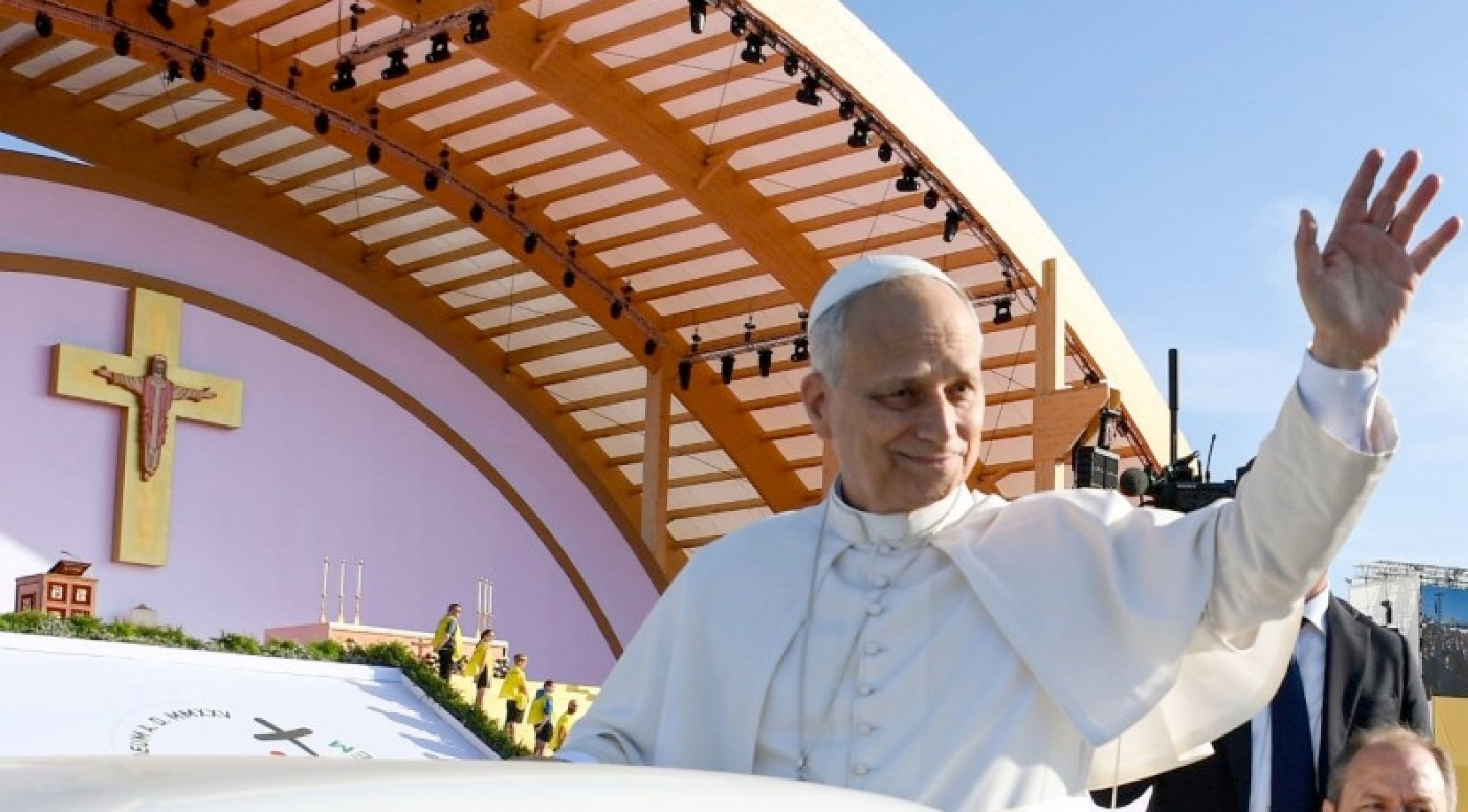(ZENIT News / Rome, 08.05.2025).- In an age of deep political divisions and cratering public trust in leadership, one figure has risen—unexpectedly and unmistakably—above the fray. According to a recent Gallup poll conducted from July 7 to 21, Pope Leo XIV is not only the most favorably viewed figure among a list of 14 global and American leaders but also the only one who enjoys a broad net-positive image across party lines in the United States.
While most political and public figures today struggle to break even in public opinion—or suffer widespread disapproval—the American pope has carved out a unique place in the national consciousness. With a 57% favorable rating and just 11% unfavorable, Leo scores a remarkable net favorability of +46, far surpassing the next most well-regarded figures: Ukrainian President Volodymyr Zelenskyy (+18) and Senator Bernie Sanders (+11).
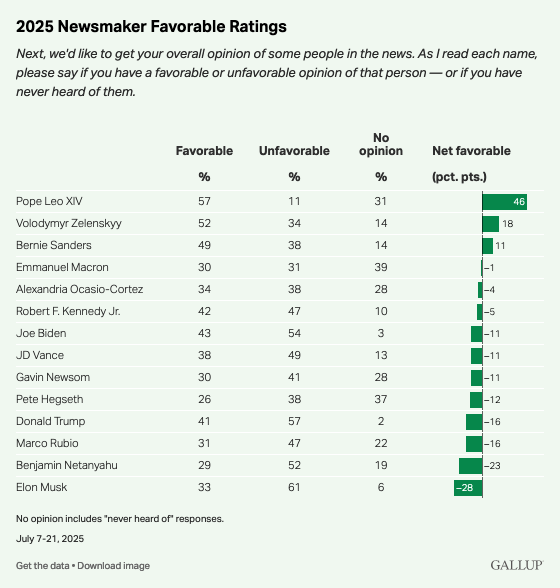
The numbers tell a striking story. In a field crowded with partisanship and polarization, Leo stands out for being broadly appealing, not just among American Catholics, but across the ideological and political spectrum. His favorability is notably high among liberals (65%) and Democrats, but he is also viewed more positively than negatively by conservatives and Republicans—an achievement unmatched by any of the other figures tested in the poll.
By contrast, nearly all other public figures—including President Donald Trump, former President Joe Biden, Elon Musk, and Israeli Prime Minister Benjamin Netanyahu—are viewed more negatively than positively. In fact, Musk and Senator Marco Rubio registered some of the steepest declines in public opinion since January, each dropping 24 points in net favorability. Musk, once seen as a polarizing but innovative force, now holds a net rating of -28, while Rubio, who now leads both the State Department and National Security Council, has fallen to -16.
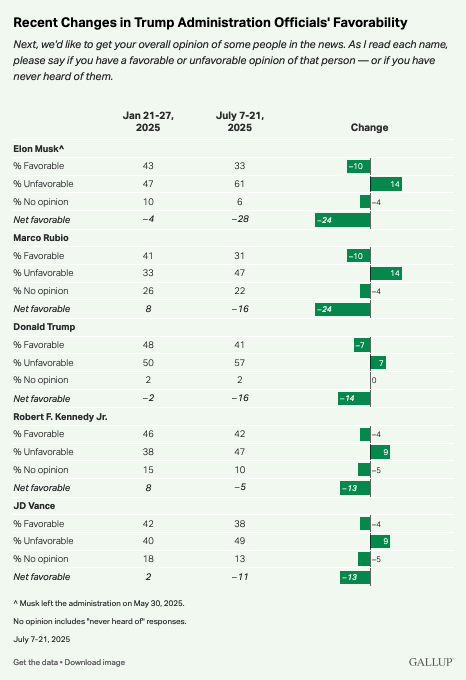
The data reveals a broader trend: deepening polarization around nearly every public figure with clear political affiliation. Biden, Vice President JD Vance, Governor Gavin Newsom, and others have net-negative scores, with their appeal often sharply divided along party lines. Democrats strongly favor Sanders and Ocasio-Cortez, while Republicans overwhelmingly back Vance and Trump—but both groups offer little crossover support to figures from the opposing camp.
Leo’s distinctiveness lies in his capacity to transcend these divides. Like his predecessors Pope Francis and Pope Benedict XVI, Leo begins his papacy with a strong foundation of support in the United States. His 57% favorability is nearly identical to the debut ratings of Francis in 2013 (58%) and Benedict in 2005 (55%). Among American Catholics, Leo’s favorability rises to 76%, slightly below Francis at 80%, but significantly higher than Benedict’s 67%.
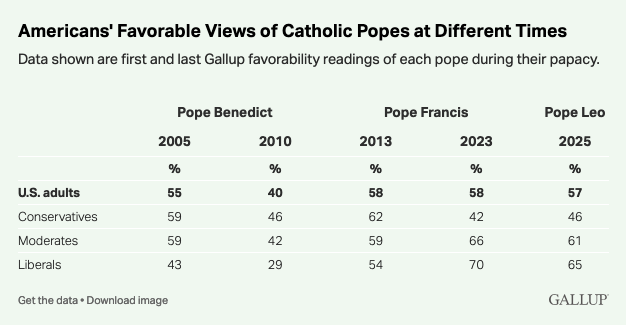
What is especially notable about Leo, however, is how his early image diverges from that of previous popes in political alignment. Both Benedict and Francis initially drew stronger support from conservatives. Leo, by contrast, is more warmly received by liberals from the outset. This reversal mirrors the trajectory of Francis, whose favorability among conservatives waned over the years as he increasingly emphasized social justice, environmental protection, and openness to marginalized groups. Leo’s early reception suggests that Americans may perceive him as a continuation of that legacy—or are at least assuming so until further clarity emerges.
The Gallup data also highlights the enduring challenge of visibility and recognition. Figures like French President Emmanuel Macron and Secretary of Defense Pete Hegseth suffer from low public familiarity, with many Americans lacking enough information to form an opinion. Leo, while not yet a household name, enjoys relatively broad recognition for a newly elected pontiff, with only 13% saying they haven’t heard of him at all.
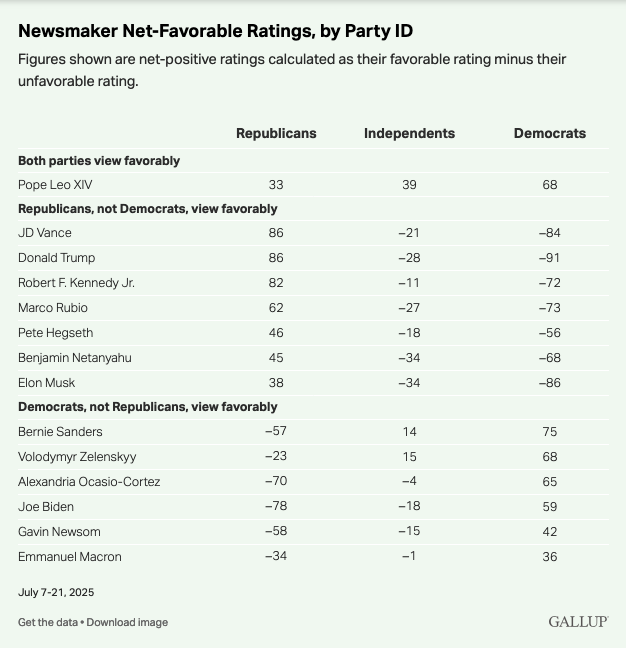
What emerges from this survey is a compelling contrast. Political figures appear increasingly locked into cycles of partisan approval and disapproval, with little room for middle ground. Pope Leo, meanwhile, stands as a rare figure of consensus—perhaps because he speaks from a moral and spiritual platform rather than a political one. Yet even this nonpartisan posture has its limits, as seen in how his favorability already skews toward one ideological camp.
Still, for now, Leo’s image remains refreshingly unifying.
Thank you for reading our content. If you would like to receive ZENIT’s daily e-mail news, you can subscribe for free through this link.
